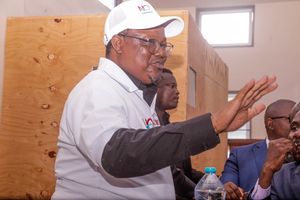How digitisation helps preserve Tanzania’s rich heritage

Edda Sanga (R) explores the stodio, an important heritage asset. Photo | Esther Kibakaya
What you need to know:
A situation analysis of the records and archives in Tanzania made by Unesco and European Union(EU) have identified the inaccessibility, lack of awareness and knowledge about content of the heritage archives as factors that hinder national ownership of its historical memory.
Tanzania has made considerable strides in improving records and Information management system within government bodies. However, the needs of Tanzanian public and private heritage archives have remained largely unaddressed.
A situation analysis of the records and archives in Tanzania made by Unesco and European Union(EU) have identified the inaccessibility, lack of awareness and knowledge about content of the heritage archives as factors that hinder national ownership of its historical memory.
In addressing the above challenges, Unesco in collaboration with the partners and association of the European Union funded a project for safeguarding, preservation and promotion of the Heritage Archives of Tanzania. The African Liberation Heritage Archives in particular, inaugurated the Mwalimu Nyerere African Liberation Memorial studio at the Tanzania Broadcasting Corporation.
The studio is an important heritage asset, as a monumental site that was prominently used in the Liberation era as a broadcasting station with an external service channel dedicated to the struggle in Southern Africa. Then known as Radio Tanzania aired programs and recruited journalists from nearly all the liberation movements.
The renovation of the space permits the facility to be used as a permanent display of the Liberation Heritage Archives through a Radio Museum, for greater public access to documentary heritage. The restored section currently hosts two digitization rooms and repositories, two listening rooms and a memorial space.
Dr Ayoub Ryoba, Director General of Tanzania Broadcasting Corporation applauds the project saying it has come at a right time, “technology is everything and this project has helped us to store the history which has started to perish because these records were stored in analogy. Because of time, some of them were at risk of being damaged but now we are sure that they will exist for a long period of time. Because of this project we have now started using some of the old programs which were recorded years back; this makes us more proud of our history. We are sure that the generation to come will have a lot to learn,” says the Director.
On his part, Charles Stuart, Charge d’ Affaires of the European Union to Tanzania and the Eastern African Community said Tanzania played a central role in assisting Africa’s movement fighting for liberation and Mwalimu Nyerere was a key figure in the efforts that were made to bring peace, freedom and unity to Africa.
“While celebrating its heroes and the role of Tanzania as a frontline State in the efforts of African Liberation, we also recognise the contribution of many ordinary citizens towards achieving the goal of Independence in various countries of the continent. The more than one thousand hours of audio records already digitized during the implementation of this project are precious testimonies of these efforts,” he says.
He went further saying, “This rich heritage is invaluable to Tanzanians as well as schools and Africans across the globe, who seek to understand the history of their nation. Audio and video records can provide a unique insight into this past and help us understand our identity as well as the legacy of our forebears. It helps us to comprehend our past, to make sense of our present and helps us consider our prospect for the future.”
He added that for these reasons audio-visual heritage should be safeguarded, but also promoted as broadly as possible and made accessible to everyone. “Preservation and dissemination must go hand in hand, they are interdependent. No widespread access of heritage archives is possible if these archives are lost as a result of decay, neglect or technological obsolescence
UNESCO Regional Director for Eastern Africa, Ann Therese Ndong-Jatta, said the project helps to ensure the sustainability of the audio and print heritage archives by increasing accountability, accessibility and enhancing coordination of the management of this important heritage in Tanzania.
“This project demonstrates that freedom of expression is really very important for any form of freedom that we need. People must be able to speak freely.
Let us also make sure the heritage is open to the world by bringing scholars across the world and as they sit to enjoy the great work that has been done by the late Mwalimu Nyerere, they should be able to understand in their own languages too.
She said the achievement of the project will be sustainable under the Roads to Independence: The African Liberation Heritage Programme is a continental programme with its headquarters hosted in Tanzania, currently implemented in the SADC region countries in African with Tanzania as a lead coordinator for this very important initiative.




